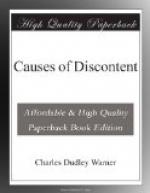Discontent, then, arises from absurd notions of equality, from natural conditions of inequality, from false notions of education, and from the very patent fact, in this age, that men have been educated into wants much more rapidly than social conditions have been adjusted, or perhaps ever can be adjusted, to satisfy those wants. Beyond all the actual hardship and suffering, there is an immense mental discontent which has to be reckoned with.
This leads me to what I chiefly wanted to say in this paper, to the cause of discontent which seems to me altogether the most serious, altogether the most difficult to deal with. We may arrive at some conception of it, if we consider what it is that the well-to-do, the prosperous, the rich, the educated and cultivated portions of society, most value just now.
If, to take an illustration which is sufficiently remote to give us the necessary perspective, if the political economists, the manufacturers, the traders and aristocracy of England had had chiefly in mind the development of the laboring people of England into a fine type of men and women, full of health and physical vigor, with minds capable of expansion and enjoyment, the creation of decent, happy, and contented homes, would they have reared the industrial fabric we now see there? If they had not put the accumulation of wealth above the good of individual humanity, would they have turned England into a grimy and smoky workshop, commanding the markets of the world by cheap labor, condemning the mass of the people to unrelieved toil and the most squalid and degraded conditions of life in towns, while the land is more and more set apart for the parks and pleasure grounds of the rich? The policy pursued has made England the richest of countries, a land of the highest refinement and luxury for the upper classes, and of the most misery for the great mass of common people. On this point we have but to read the testimony of English writers themselves. It is not necessary to suppose that the political economists were inhuman. They no doubt believed that if England attained this commanding position, the accumulated wealth would raise all classes into better conditions. Their mistake is that of all peoples who have made money their first object. Looked at merely on the material side, you would think that what a philanthropic statesman would desire, who wished a vigorous, prosperous nation, would be a strong and virile population, thrifty and industrious, and not mere slaves of mines and mills, degenerating in their children, year by year, physically and morally. But apparently they have gone upon the theory that it is money, not man, that makes a state.




